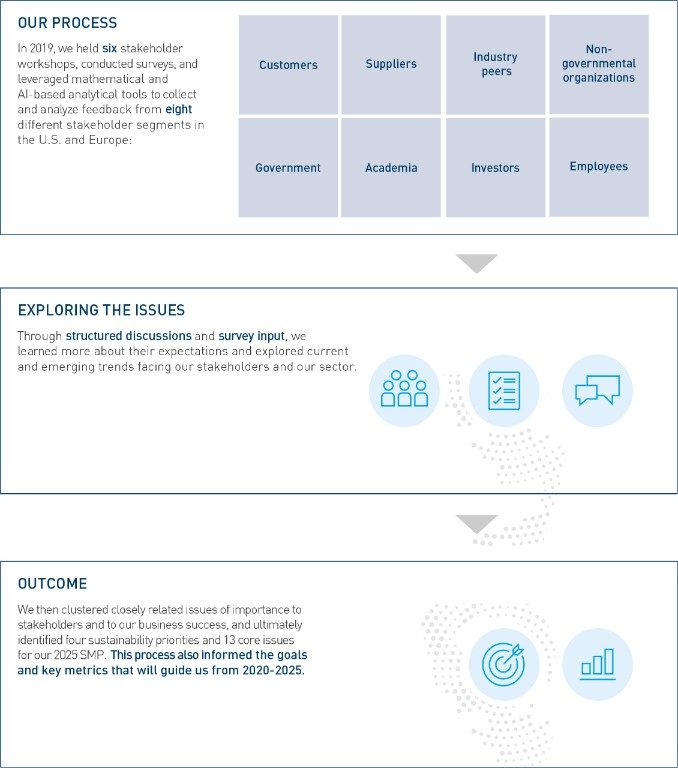Materiality Assessment
At Lockheed Martin, we integrate sustainability throughout our business strategy. To understand the core issues that are most material to our business, it is vital to engage with a wide range of stakeholders to seek feedback and input and to analyze industry trends, which we do continuously, in addition to conducting a robust assessment every five years. Our core issues inform our Sustainability Management Plan (SMP), which provides a strong framework to clearly define our goals and drive our sustainability progress. We also focus on relevant other sustainability topics beyond the SMP that have an impact on people and our planet.
Our Core Issues Assessment Process
Lockheed Martin performs a formal core issues assessment every five years to ensure that we continue to prioritize issues that are relevant to our business and that matter most to our stakeholders. Feedback is key to this process and involves engaging with a diverse group of global internal and external stakeholders, including employees, suppliers, customers, investors, academia and non-governmental organizations through surveys, interviews and other outreach.

The input is compiled and used to narrow down a core group of sustainability issues most material to our stakeholders and business. According to the Global Reporting Initiative (GRI), material topics “represent the organization’s most significant impacts on the economy, environment, and people, including impacts on their human rights.”
These results are compared with business sector-specific results identified by an artificial intelligence tool that performs materiality analysis by assessing corporate sustainability reports, annual reports, and U.S. Securities and Exchange Commission (SEC) filings; scanning mandatory regulations; and targeting media focus on a given issue to provide broader external sentiments on sustainability issues. We also compare our results with the list of financially material issues outlined by the International Sustainability Standards Board (ISSB) for the aerospace and defense sector. These data sets help cross-check, validate and prioritize the core issues that will guide Lockheed Martin’s SMP.
Our Sustainability organization oversees the core issues assessment process. The Lockheed Martin Sustainability Management Team regularly reviews SMP progress and the Risk and Compliance Committee provides a forum for business area and corporate functional executive leadership to review and guide enterprise sustainability initiatives. Our Executive Leadership Team and our president and chief executive officer provide final approval of the core issues, which are then presented to the Nominating and Corporate Governance Committee of the Board. After the core issues are established, we work with internal stakeholders to create specific sustainability goals that we use to track our performance.
Our Core Issues
The 13 core issues that constitute Lockheed Martin’s 2025 SMP are grouped into four priority categories.
Prevent counterfeit components from entering the company's supply chain and potentially affecting product quality, safety and performance.
Manage energy use and supply associated with company operations, including promoting energy efficiency and use of renewable energy.
Manage and reduce the use of hazardous materials and chemicals in our own operations and throughout our supply chain, including compliance with the EU's Registration, Evaluation, Authorisation and Restriction of Chemicals (REACH) and other applicable legislation.
Mitigate the risk of dependence on mineral resources and other substances for use in products.
Improve the total cost of ownership of products for customers through constant affordability and operability improvements across areas such as product quality, efficiency, performance, resilience and sustainment.
Exploit business opportunities, minimize impact of technological disruptions, manage ethical challenges, monitor human rights implications and mitigate adverse talent impacts that result from the growing development of autonomous systems capable of performing tasks that once required human intelligence and/or presence.
Ensure the protection of both company and supplier proprietary information to prevent likelihood of data fraud, loss, sabotage, and theft and protect the privacy and data integrity of our employees.
Protect the results of investment in the development of new technology, with the purpose of giving the incentive and means to finance research and development activities; stimulate innovation, design and creation of technology; and facilitate the transfer of technology in the form of foreign direct investment, joint ventures and licensing.
Provide a workplace where incidents of unwelcome sexual advances, requests for sexual favors and other verbal or physical conduct of a sexual nature are not tolerated and where accusations of such behavior are appropriately addressed. Provide a workplace where verbal or physical abuse is not tolerated and where accusations of such behavior are appropriately addressed.
Our workforce representation strategy is underpinned by strong policies, which protect employees and exemplify the strong collective culture we strive to foster.
Manage work environments such as manufacturing and use of hazardous substances with effective engineering controls and ergonomics to ensure a safe and healthy workforce and workplace.
Ensure effectiveness and quality of corporate governance and disclosures regarding our policies, practices, performance, and the level of involvement of executive management and Board of Directors.
Prevent bribery and corruption among employees, suppliers and contractors, including advisors.
To learn more about the management of each SMP goal, visit our 2025 SMP Management website. To see our annual progress toward these goals, visit our 2024 Sustainability Performance Report.
Continuous Evolution
At Lockheed Martin, we have developed robust processes to monitor emerging issues and continue to evolve our sustainability efforts between our formal five-year core issues assessments. Our dedicated Sustainability organization includes experienced and expert staff who maintain currency with global program and reporting compliance requirements, emerging priorities and trends. In addition, we actively participate in sector-specific and broad industry organizations and forums, and we conduct formal and informal benchmarking of our programs, priorities and goals. As a company, we maintain active engagement with our investors, customers and a broad range of both internal and external stakeholders. In 2024, we conducted a complete double materiality assessment that will become the foundation of our next formal five-year SMP and associated goals and enable our preparations for emerging sustainability reporting requirements.


